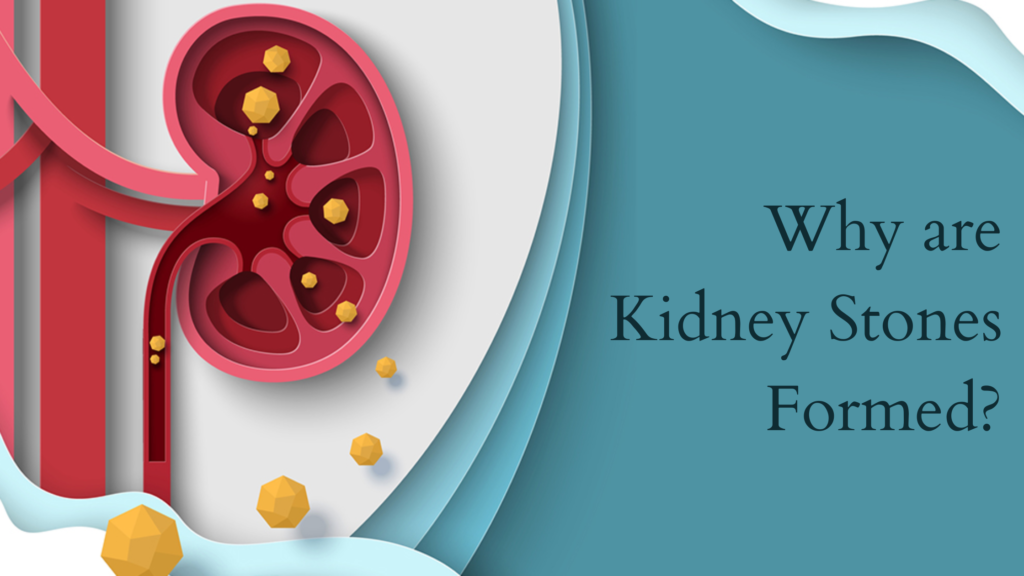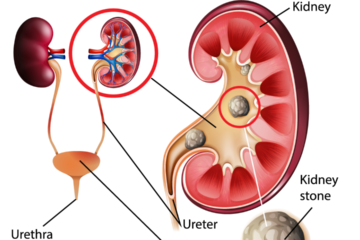
Kidney stones, the unwelcome guests of the urinary tract, have plagued humans for centuries, causing excruciating pain and discomfort. Yet, amidst this suffering, lies a fascinating tale of physiological intricacies and environmental influences. Understanding why kidney stones form is not merely a pursuit of medical knowledge but an exploration into the delicate balance of our body’s chemistry and the impact of our lifestyle choices.
The genesis of kidney stones is a multifaceted phenomenon, influenced by an interplay of various factors ranging from dietary habits to genetic predispositions. At its core lies the intricate chemistry of urine, where solutes and solvents engage in a delicate dance, occasionally faltering and giving rise to solid crystalline formations.
In this blog, we embark on a journey to unravel the mysteries of kidney stone formation. We’ll delve deep into the underlying causes, explore the different types of kidney stones that can arise, and discuss strategies for prevention. By shedding light on this enigmatic process, we empower ourselves with knowledge, equipping us to navigate the waters of urinary health with confidence and resilience. So, let’s embark on this voyage of discovery, as we seek to demystify the origins of kidney stones and pave the way towards a future free from their painful grip.
Understanding Kidney Stone Formation
Understanding kidney stone formation requires delving into the intricate processes of urinary chemistry and the factors that influence crystallisation. Kidney stones typically develop when certain substances in urine become highly concentrated, leading to the formation of solid crystals. These crystals can then aggregate and grow into larger stones over time. Let’s break down this process in detail.
Urine Composition
- Urine is a complex solution composed of water and various waste products, including salts, minerals, and organic compounds.
- The concentration of these substances in urine is influenced by factors such as hydration levels, dietary habits, and underlying medical conditions.
- Normal urine contains substances like calcium, oxalate, uric acid, and citrate, among others, which are typically present in a soluble form.
Crystal Formation
- When certain substances in urine are present in high concentrations, they can exceed the solubility limits and begin to precipitate out of the solution in the form of crystals.
- Common types of crystals that contribute to kidney stone formation include calcium oxalate, calcium phosphate, uric acid, and struvite crystals.
- Factors that can promote crystal formation include dehydration, dietary factors (such as high intake of oxalate-rich foods), urinary pH imbalances, and underlying metabolic disorders.
Crystal Aggregation
- Once crystals form in the urine, they can aggregate and adhere to one another, forming small clusters.
- This aggregation process may be facilitated by factors such as the presence of urinary proteins or other substances that act as binding agents.
- As these clusters grow larger, they may become lodged in the kidney or urinary tract, leading to the formation of kidney stones.
Stone Growth and Maturation
- Over time, the small clusters of crystals continue to accumulate mineral deposits and other substances, gradually growing into larger stones.
- The composition of the stones may vary depending on the predominant types of crystals present and the specific conditions within the urinary tract.
- Factors such as urinary stasis (reduced urine flow), anatomical abnormalities, or the presence of bacterial biofilms can contribute to stone growth and maturation.
Stone Passage and Symptoms
- As kidney stones grow, they may obstruct the flow of urine within the urinary tract, leading to symptoms such as severe pain, urinary urgency, and blood in the urine.
- The passage of kidney stones through the urinary tract can be harrowing and may require medical intervention for relief.
- Depending on the size and location of the stones, they may pass spontaneously or require treatments such as medications, lithotripsy (shock wave therapy), or surgical intervention.
Types of Kidney Stones
Kidney stones can vary in composition, with the most common types being calcium oxalate and calcium phosphate stones. Other types include uric acid, struvite, and cystine stones. Each type has distinct characteristics and may require different treatment approaches.
Calcium Oxalate Stones: These are the most prevalent type of kidney stones and form when calcium combines with oxalate in urine to create crystals.
Calcium Phosphate Stones: Similar to calcium oxalate stones, these form when calcium combines with phosphate in urine.
Uric Acid Stones: These form when urine is acidic and contains high levels of uric acid, often associated with conditions like gout or certain metabolic disorders.
Struvite Stones: Also known as infection stones, these are typically caused by urinary tract infections and consist of magnesium, ammonium, and phosphate.
Cystine Stones: These rare stones form due to a genetic disorder called cystinuria, which causes excessive excretion of cystine in urine.
Prevention Strategies
Preventing kidney stones requires a multifaceted approach that involves adopting lifestyle modifications and dietary changes aimed at reducing the risk of crystal formation and promoting urinary health. Here’s a detailed explanation of various prevention strategies:
Stay Hydrated
- Adequate fluid intake is crucial for preventing kidney stone formation. Drinking plenty of water helps dilute urine, reducing the concentration of minerals and preventing crystals from forming.
- The general recommendation is to drink enough fluids to produce at least 2 litres (about 8 cups) of urine per day. However, individual fluid needs may vary based on factors such as climate, physical activity level, and medical history.
- Water is the best choice for hydration, but other fluids like herbal teas and diluted fruit juices can also contribute to overall fluid intake.
Dietary Modifications
- Adjusting your diet to reduce the intake of certain substances that contribute to stone formation can help prevent kidney stones.
- Limiting foods high in oxalates, such as spinach, rhubarb, nuts, and chocolate, can help reduce the risk of calcium oxalate stone formation.
- Reducing sodium intake is also important, as high salt consumption can increase urinary calcium excretion, contributing to stone formation.
- Moderating intake of animal protein, especially red meat and poultry, can help lower uric acid levels in urine and reduce the risk of uric acid stone formation.
- Increasing dietary calcium from sources like dairy products or fortified foods can help bind with oxalates in the intestine, preventing them from being absorbed into the bloodstream and excreted in urine.
Monitor Sodium and Protein Intake
- High sodium intake can lead to increased calcium excretion in the urine, which can contribute to calcium stone formation. Therefore, reducing sodium intake by avoiding processed foods, canned soups, and salty snacks is advisable.
- Excessive consumption of animal proteins, particularly red meat and poultry, can increase the risk of uric acid and calcium oxalate stone formation. Balancing protein intake with plant-based sources and opting for lean protein sources like fish or poultry can help mitigate this risk.
Maintain a Healthy Weight
- Obesity and excess body weight are associated with an increased risk of kidney stones. Maintaining a healthy weight through a balanced diet and regular physical activity can help reduce this risk.
- Aim for a diet rich in fruits, vegetables, whole grains, and lean proteins, and engage in regular exercise to support overall health and prevent weight gain.
Medication and Supplements
- In some cases, healthcare providers may recommend medications or supplements to help prevent kidney stone formation.
- For individuals with recurrent calcium oxalate stones, medications like thiazide diuretics or potassium citrate may be prescribed to reduce urinary calcium excretion or increase citrate levels, respectively.
- Supplements such as magnesium citrate or potassium citrate may also be recommended to help prevent stone formation by reducing urinary oxalate levels or increasing urinary citrate levels.
Regular Monitoring and Medical Evaluation
- Individuals with a history of kidney stones or underlying medical conditions that increase the risk of stone formation should undergo regular monitoring and medical evaluation.
- This may include periodic urine and blood tests to assess urinary composition and identify any abnormalities that may predispose to stone formation.
- Healthcare providers can offer personalized recommendations based on individual risk factors and medical history to help prevent kidney stones effectively.
Conclusion
By staying hydrated, making dietary modifications, maintaining a healthy weight, and working closely with healthcare providers, individuals can significantly reduce their susceptibility to kidney stone formation. Additionally, regular monitoring and medical evaluation are essential for those with a history of kidney stones or underlying medical conditions predisposing them to stone formation.
As we conclude our exploration into the mysteries of kidney stone formation, let us remember that prevention is the cornerstone of urinary health. By adopting a holistic approach that addresses lifestyle factors and incorporates medical guidance, we can pave the way towards a future free from the pain and inconvenience of kidney stones. Together, let us strive to promote awareness, empower individuals with knowledge, and embark on a journey towards optimal urinary tract health.
Dr. Sumit Sharma is an experienced urologist, andrologist, and kidney transplant surgeon with over 20 years of clinical experience. He is the founder of the Department of Urology at multiple hospitals in Gurgaon and has established successful kidney transplant programs across the city.
With a commitment to the highest standards, Dr. Sumit Sharma ensures personalised, professional treatment, making your well-being the primary focus. Choose Dr. Sumit Sharma for outstanding Urological care in Gurgaon.



